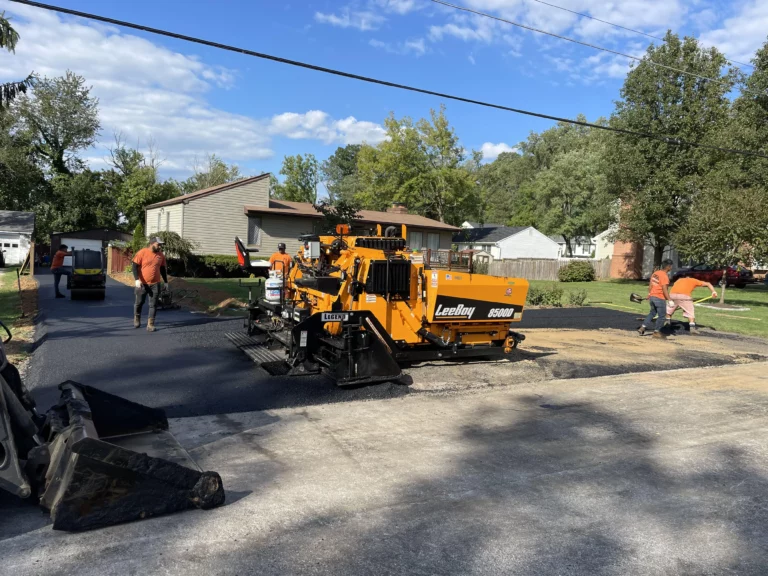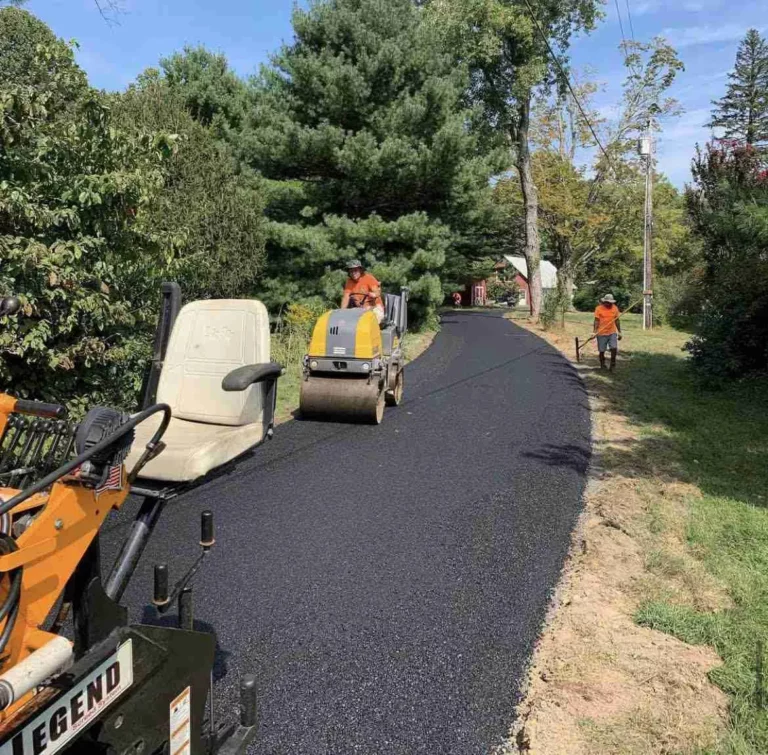RSA PAVING BLOG
The Science Behind Asphalt: A Guide to Composition and Performance from a Top Paving Contractor
If you’re looking to pave or resurface your home’s driveway, parking lot, or roadway, finding an experienced asphalt paving contractor is key to getting quality work. In this guide, we’ll walk you through the science behind asphalt, its composition, and what factors impact its performance. Read on to learn what makes asphalt tick and how to identify the markings of an expert paving company.

What Exactly is Asphalt?
Asphalt is a refined product made from petroleum that serves as a binder to hold aggregates together. It’s composed of bitumen, a black or dark brown material, as well as mineral aggregates like sand, gravel, and crushed stone. An asphalt paving mix contains approximately 5% asphalt binder and 95% aggregates. The asphalt binder glues the aggregates together to form a durable paving surface.
Aggregates make up the majority of an asphalt mix. They provide the load-bearing strength and structure, while the asphalt cement binds everything together. The quality and size gradation of aggregates are critical to achieving high-performing asphalt pavement. A paving company with expertise in aggregate selection and blending will achieve superior results.
What Properties Does Asphalt Have?
Asphalt possesses properties that make it an ideal paving material in many applications, including highways, driveways, parking lots, airports, and more. Key advantages include:
Have A Project In Mind?
Let's Text About Your ProjectFlexibility – Asphalt can flex and stretch without cracking, making it durable under loading and temperature changes. This gives it an advantage over concrete.
Water Resistance – Asphalt resists water penetration and damage.
Adhesion – Asphalt binds strongly to aggregates as well as old asphalt surfaces. This allows new asphalt to adhere to existing pavement.
Recyclability – Old asphalt can be ground up and remixed into new asphalt. Most asphalt mixes contain a percentage of recycled material.
Customization – Asphalt mixes can be customized with specialty additives to enhance durability, friction, color, and more.
Affordability – Asphalt is one of the most economical paving materials.
In Need of Paving Services?
Start Your Project Today

What Factors Impact Asphalt Performance?
While asphalt is versatile and durable, many factors impact how well it performs over time. An experienced paving contractor will understand these variables and how to optimize the asphalt mix. Key factors include:
Asphalt Thickness
Thicker asphalt surfaces better spread vehicle loads and resist damage. Thickness should be designed appropriately for the traffic volume and loading.
Aggregate Quality
The shape, size gradation, and composition of aggregates affect strength and durability. Angular crushed aggregates interlock and bind together.
Asphalt Binder Chemistry
Asphalt binder can be customized through additives and polymer modification to improve properties for a given climate.
Construction Quality
Proper handling, heating, and compaction during installation impacts performance. An expert contractor is essential.
Drainage
Proper slope and drainage prevents water pooling on the surface, which can cause potholes, cracking, and other issues.
Traffic and Loading
Higher traffic volumes and vehicle weights necessitate thicker, stronger asphalt to resist wear and deformation over time.
Maintenance
Lack of maintenance shortens lifespan. Timely repairs, sealcoating, and preventative care extend service life. Check out our post on maintenance here.
How is Asphalt Produced and Installed?
Producing high-quality asphalt and properly installing it is complex. (Resource: ScienceDirect) Here is a simplified overview:
Crude oil is distilled into fractions. The heaviest fractions undergo additional processing to make asphalt binder.
Get In Touch!
Text Us For A QuoteAggregates are crushed, screened, and precisely blended to specification. Hot asphalt cement and aggregates are combined in a mixing plant.
The hot-mix asphalt is hauled by truck to the paving site. It must be kept hot during transport.
A paving machine spreads and compacts the mix evenly over the prepared base. Rolling compacts it to the desired density.
For large jobs, a material transfer vehicle is used so trucks don’t have to drive directly on fresh asphalt mats.
Joints are carefully constructed to avoid weak spots. A smoothness testing machine may be used for quality assurance.
How Can You Identify a High-Quality Paving Contractor?
With so many variables impacting asphalt quality, the paving contractor you choose makes all the difference. Here are 6 telltale signs of an expert asphalt company:
Decades of Experience – Look for 30+ years in business performing asphalt paving. This ensures deep expertise.
Local Reputation for Quality – Seek contractors with a strong regional presence and reputation for top-notch workmanship.
Proper Licensing and Insurance – Verify licensing, bonding, liability and workman’s comp insurance to protect yourself should issues arise.
Latest Equipment – Modern pavers and rollers ensure proper installation. Well-maintained trucks prevent mix problems.
Questions About A Project?
Let's Connect!Expert Personnel – Employees should be paving specialists with training on best practices. Look for certified paving technicians.
Warranty on Work – The best paving contractors offer a warranty on materials and workmanship for multi-year protection.
Key Takeaways on Asphalt and Working with a Paving Contractor
Asphalt is petroleum-based but contains mostly stone aggregates. It is durable, recyclable, and affordable.
Multiple factors impact asphalt pavement performance, from mix design to construction quality. An expert contractor optimizes these.
Finding an experienced local paving contractor with proper certifications, modern equipment, trained staff, and warranties results in the highest quality job.
Be wary of low bids – often this means cutting corners on materials, workmanship, or safety.
Proper asphalt installation and timely maintenance are the best ways to maximize lifespan and value from your paved surfaces.
For assistance on your next paving project, contact the team of asphalt professionals here at Quality Paving Company. With over 30 years in business serving homeowners and businesses, we have the expertise to meet your unique needs. Reach out today to get started!

Frequently Asked Questions (FAQs)
What services does a paving contractor provide?
A paving contractor provides a range of services related to asphalt paving and construction projects. This includes services such as driveway construction, road paving, parking lot installation, and asphalt maintenance.
How do I contact a paving contractor for my project?
You can contact a paving contractor by using the contact information provided on their website or by giving them a call. Most paving contractors have a dedicated customer service team that can assist you with any inquiries or project details you may have.
What is the difference between a residential and commercial paving project?
A residential paving project typically involves the construction or repair of driveways and private roadways leading to a home. On the other hand, a commercial paving project involves larger-scale projects such as parking lot construction, roadways for businesses, or airport runways.
What expertise does a paving contractor have?
A paving contractor has expertise in various areas related to asphalt paving and construction. This includes knowledge of asphalt production, milling, sealcoating, and ensuring proper traffic safety measures are implemented during the project. They also possess expertise in working with different surfaces and materials to deliver high-quality results.
What equipment does a paving contractor use?
A paving contractor uses a variety of equipment suited for different stages of the paving process. This can include asphalt pavers, rollers, milling machines, dump trucks, and other specialized equipment to ensure a smooth and efficient paving process.
How does a paving contractor maintain quality in their construction?
A paving contractor maintains quality in their construction by using industry-proven techniques, following proper construction standards, using high-quality asphalt and materials, and employing skilled and experienced workers. They may also have quality control processes in place to ensure that the final result meets or exceeds customer expectations.
Do I need to be present during the paving project?
In most cases, it is not necessary for you to be present during the entire paving project. However, it is recommended to be available at the beginning and end of the project to communicate any specific requirements or to inspect the final result.
How long does an average paving project take?
The duration of an average paving project can vary depending on the size and complexity of the project. Generally, a residential driveway can be completed within a day or two, while larger commercial projects may take several weeks or months to finish.
Can a paving contractor assist with asphalt maintenance?
Yes, a paving contractor can assist you with asphalt maintenance to prolong the lifespan and appearance of your paved surfaces. This can include services such as sealcoating, crack filling, and regular inspections to
Residential Paving
Get A Free Same Day Quote
Let's connect for a free, no hassle same day quote. Enter your information below to get the conversation started!